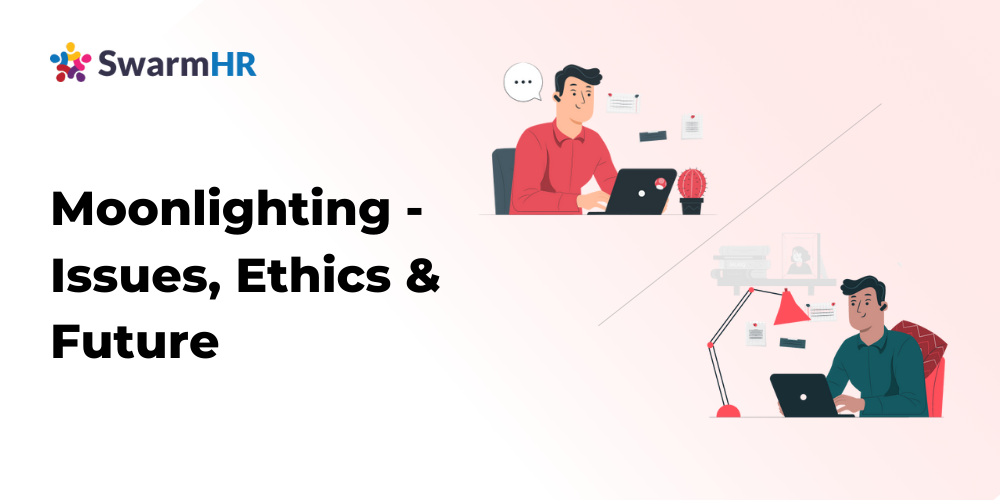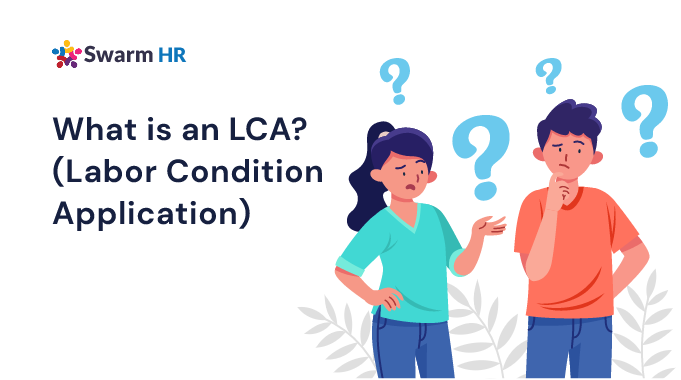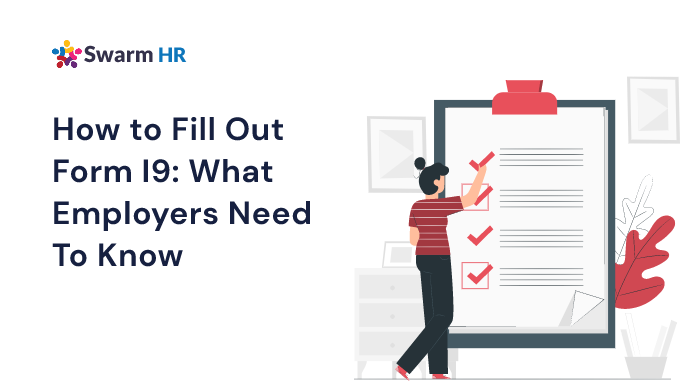Moonlighting - Issues, Ethics & Future

Have you heard of the term “moonlighting“? It means having a second job, as in you have your nine-to-five job and once you’re done with that, you take up another assignment; that’s “moonlighting”. The term has become an apple of discord. There’s a lot of debate online about whether it’s ethical or if it’s like cheating on your first job. Employees are cheering for moonlighting; employers, obviously not so much, worry about productivity loss, employees about not making the most of their time. The concept is not new, but the debate is, and there’s a need to find the middle ground.
So we thought, why not try and answer some critical questions first?
For example, is moonlighting legal? What does the law have to say about this? Is it indeed ethical? How many people are currently moonlighting? Is this the future of work? We’ll discuss all of this and more in the article below.
Starting by deep diving into the concept of moonlighting, what is it all about? Simply put, moonlighting involves taking up an assignment outside of your work. This assignment could be anything related or unrelated to your first job.
Moonlighting vs. Freelancing
So how is moonlighting different from freelancing? You see, a freelancer is not an employee; she is self-employed and provides services to multiple organizations. Moonlighting on the other hand is when a full-time employee holds multiple jobs. You could be a salesperson from nine to five; but you could be a DJ at night; you could be a lawyer while moonlighting as a part-time professor of law; you could be a journalist and also have your own youtube channel. You get the gist.
Now why is moonlighting called what it is? Because the second job is usually taken up after normal work hours, meaning it’s mostly an evening job and that’s the association with the moon.
Why do people moonlight?
To maximize their talent, to make the most of their potential, and to earn an extra income. It could be for passion, for financial security, to give your creativity a chance, or simply because you want to. Jobs in writing, translation, graphics design, animation consulting, social media marketing, and influencer marketing – a whole lot of things.
During the lockdown, Working from home has given people extra time to work on other things apart from their regular jobs. They’re saving time on travel and many are using that time to monetize. In India alone, A survey of 400 Indian tech employees found that 65 of them knew someone who was moonlighting. Experts say this could be because Indian tech workers are generally underpaid but moonlighting is not limited to any particular sector. You may have seen school teachers giving private tuition or doctors having private practice. This is not specific to any particular level of worker; very often top-level employees render their services as consultants and mentors. And this is not a concept that is unique to a particular nation; as of 2015, some seven and a half million Americans were holding multiple jobs, which is five percent of the U.S workforce. During the pandemic, the numbers went up globally and now there’s a big debate online.
What is the present moonlighting debate all about?
Moonlighting worries employers because they worry that it could lead to
- a potential conflict of interest.
- There could also be a breach of confidentiality.
- Employees could be misusing company resources, like using office laptops for other gigs.
- Moonlighting could lead to absenteeism, fatigue, and burnout.
And these are all valid concerns, but so is the argument in support of moonlighting. It is quite simple. If an employee can afford to do more and earn more, why shouldn’t they? As long as it does not get in the way of a primary job, why should moonlighting be anybody’s business? If anything, an employee may be able to bring more to the table. Every new assignment comes with an opportunity to learn, and an employee who is constantly learning is always an asset.
What does the law say on Moonlighting?
For starters, the term “moon lighting” is new, so if you’re talking about Indian law, we look at dual employment. What does it say? The factory act of 1948 prohibits dual employment in India, but this act does not regulate the engagement of employees across all sectors. It only regulates labour in factories. What about the rest? There is no specific law prohibiting moonlight in India.
The most important document in this context is actually a job contract. Its terms and conditions decide whether or not you can pick up a second assignment. There are two clauses that you should watch out for. The first one is a single employment clause. Your work contract may legally bind you to a single job. The second one is the non-compete clause. It prohibits an employer from or an employee from working with a rival company, and this can be after you’ve resigned or even during your employment. If you don’t have either of these clauses in your contract, then you can safely moonlight in India.
As with the United States and the United Kingdom, as long as you’re paying your taxes for the money that you’re making, you should be good to go. So, legally, there is a green light for moonlighting.
What about ethics?
Is it ethical to have two jobs? Is it like cheating on your employer?
Think of it this way; You have 24 hours in a day, your work contract demands that you spend 9 hours at work, so that’s 24-9 in most cases, which leaves you with 15 hours of time. What you do in those 15 hours should not be anybody’s business. You could choose to code, teach the students, you could deliver lectures, work at a department store. As long as you’re not leaking sensitive information, you should not be in a conflict of interest, and definitely not in breach of your contract.
Is this the future of work?
Who knows, these are critical and changing times. The work culture is changing; the economy is unpredictable, expenses are rising and inflation super high, and the talk of impending recession is jittery. People want to have a plan B, with everything that they do, it is also normal to want multiple sources of income, especially given how unstable the economy is right now.
People also want to hone different skill sets, work on their passion projects, so what should employers do? Like mentioned earlier, they worry about productivity loss, breach of sensitive information and employees worry about not making the most of their time. Yes, there is the need to find a middle ground, but what must that be?
New age companies started including this in their policies. For example, Swiggy, an Indian last mile delivery service company, said employers could work different jobs, and came up with the moonlighting policy earlier this month. Swiggy said employees were free to work on their projects after working hours as long as it did not affect their productivity and was not a conflict of interest, as in you can’t be working in Swiggy’s marketing team and then moonlighting as a Zomato, it’s rival, marketing manager. That demand is quite fair.
We say other companies could take a cue from this and have a proactive approach to moonlighting. Start drafting a policy that protects confidential information, define conflict of interest by informing employees of the company’s red line. After all, having a moonlighting policy helps employers more than employees because if there’s a breach, you can take corrective measures accordingly. Otherwise, it becomes a courtroom drama. Permitting employees to moonlight also helps a company project itself as a progressive workplace.
As for employees, having a policy in place helps in getting a clear understanding of their terms of appointment. This is also a reminder for governments to formulate a proper moonlighting policy. Recently, governments across the world are working on work life balance policies, some adopting, while others exploring the provision for a four-day work week. Perhaps it’s also time to incorporate the idea of having multiple jobs.
Catapult to digital-first organization
Learn More

03 June, 2022 5 min read
What is an LCA? (Labor Condition Application)
The Labor Condition Application (LCA) is a form employers must file with the United States Department of Labor Employment and Training Administration (ETA). Employers apply . . .

20 June, 2022 4 min read
What are Public Access Files?
Public Access Files With the compliance mandates around public access files (PAF), they continue to be a point of worry for recruiters and staffing agencies. Recognizing . . .

09 June, 2022 6 min read
How to Fill Out Form I9: What Employers Need . . .
How to Fill Out Form I9! Can you imagine being fined almost $800 because your employee forgot to sign a piece of paper? Multiply that one mistake by thousands of employees . . .




